Letter from Howell Cobb to David Tompkins

Treasury Secretary Howell Cobb writes to David Tompkins and accepts his election to the James Buchanan Literary Association of New Haven, Connecticut.


Treasury Secretary Howell Cobb writes to David Tompkins and accepts his election to the James Buchanan Literary Association of New Haven, Connecticut.
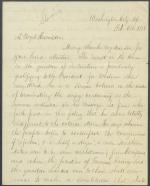
William Bigler writes to A. Boyd Hamilton and discusses President James Buchanan and several national political issues, including slavery, the Dred Scott decision, and the Lecompton Convention in Kansas.

Hiram Walbridge writes President James Buchanan to introduce Robert Gamble and recommend him for a political appointment.
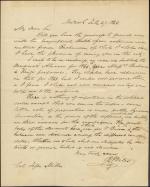
Barnabas Bates writes to Jesse Miller and asks for a "biographical sketch" of Senator James Buchanan.

Governor of Virginia Henry Alexander Wise comments on various national political issues and on the 1860 presidential election.
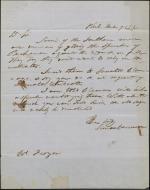
Simon Cameron writes to Reah Frazer, an attorney in Lancaster County, Pennsylvania, and requests copies of James Buchanan's speeches against the war, presumably the Mexican-American War.

Postmaster General James Campbell writes to Reah Frazer, an attorney in Lancaster County, Pennsylvania, about various political issues and James Buchanan as a possible candidate for a future Presidential election.
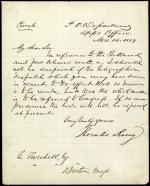
Assistant Postmaster General Horatio King writes to Ginery Twichell, president of the Boston and Worcester Railroad.

Representative Joseph Trumbull writes former Senator James Lanman to discuss the political situation in the United States Congress as well as James Buchanan's political views.
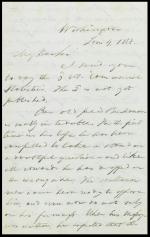
United States Senator Simon Cameron writes Samuel D. Ingham, a former United States Secretary of the Treasury, to discuss President James Buchanan and other national political matters.
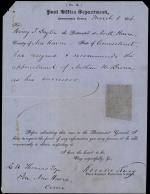
Postmaster General Horatio Collins King writes to L.A. Thomas, Postmaster of New Haven, CT, about a recent position vacancy. Collins states that Hervey T. Dayton resigned from the job and recommends Nathan U. Brown as a replacement.

Pennsylvania politician Andrew Gregg Curtin writes to John V. Hart with updates about a financial matter . Curtin hopes that once "Beckwith" is paid for the timber he sold to the Tyrone and Lock Haven Rail Road Company, he will have more money.
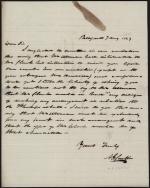
Pennsylvania Attorney Andrew Gregg Curtin (Class of 1837) warns L. M. Smith, Esq., "to be cautious not to say to Mr. Ullman that Mr.
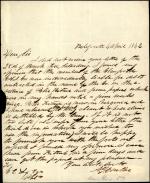
Attorney Andrew Gregg Curtin (Class of 1837) writes to an unspecified C. E. Lex, offering his opinion on a legal matter concerning liability for certain debts.

Supreme Court Chief Justice Roger Brooke Taney writes to J. Mason Campbell: "Read the note to Mr. Perine & seal it & send it to him..." Transcript included.
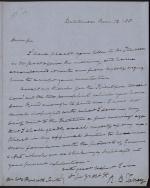
Roger Brooke Taney, Chief Justice of the United States Supreme Court, writes to Mr. William Prescott Smith: "Accept my thanks for the 'Scientific American,' and the two pamphlets....

Supreme Court Chief Justice Roger Brooke Taney writes to James K. Paulding, Secretary of the Navy, about the application of the late Levin Gale's two sons.

Spencer Fullerton Baird (Class of 1840) writes to Osmond Tiffany, responding to the latter's request for documents about the Pacific Rail Road and the Mexican Boundary.
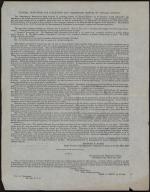
Spencer F. Baird (Class of 1840), the Assistant Secretary of the Smithsonian Institution, publishes "General Directions for Collection and Preserving Objects of Natural History" in 1848.

Spencer Fullerton Baird writes to A. Haen & Company about the redrawing of some plates. Dr. John Newberry has left, and Baird has no authority in the matter but will write to Newberry.

Chief Justice of the Supreme Court Roger Brooke Taney writes to Henry Baldwin about the delay in payment for Baldwin's books.

Chief Justice of the Supreme Court Roger Brooke Taney writes to attorney J. Mason Campbell and discusses various financial issues as well as health concerns.
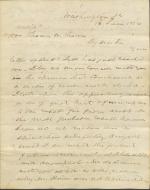
Representative Alexander Hamilton Stephens writes to Thomas W. Thomas and discusses the 1856 presidential election.

Supreme Court Chief Justice Roger Brooke Taney writes to Joel Barlow Sutherland and discusses the legal distinction between letters being "in the mail" and "in the post office." Taney notes that he cannot conduct further research on the question d

Supreme Court Chief Justice Roger Brooke Taney thanks his daughter, Alice Taney Campbell, for sending a letter that arrives on his 79th birthday.